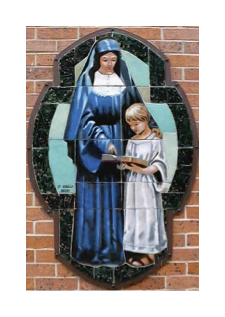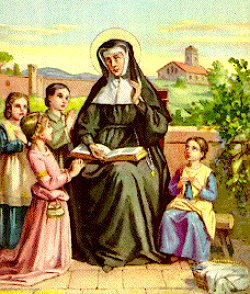
Books on Christian Women in the Patristic World
Christian Women in the Early Church
For the last few months I have posted stories on significant women from the Patristic age. The lives of many thousands of people were touched as these women followed their call from God to a life of service in His Kingdom.
Due to space, the blog posts barely cover short stories of their lives. I tried to include some background in the posts, but much more has been written about life for women during the first 5 centuries after Christ. Here are 4 of the books that I relied heavily on. They do a very thorough job of recounting the stories of early Church women, their culture, and their legacies. They are both informative and exciting to read and I highly recommend them as a truly enjoyable way to learn history!
— Cohick, Lynn H. and Hughes, Amy Brown. Christian Women in the Patristic World: Their Influence, Authority, and Legacy in the Second through Fifth Centuries(Grand Rapids, MI: Baker Academic, 2017).
This scholarly work contains the stories of women in the early Church. The book also demonstrates how the Church was helped in its formation by women. Women did more than share the good news of salvation in Christ. They helped shape theology and culture. The authors, Lynn H. Cohick and Amy Brown Hughes bring the far distant past to life for us with their extremely engaging writing. I can’t put it any better than Scot McKnight in his credit for the book, “I constantly encourage students and pastors to tell more stories about women in the early church from the pulpit, in classes, and in casual conversations. … Christian Women in the Patristic World… is a book for every pastor’s and teachers’ bookshelf because it not only tells stories about women but also shows how the early church, which has often been maligned for its reputation when it comes to women, was more formed by women than many know.”
— Cooper, Kate. Band of Angels: The Forgotten World of Early Christian Women(New York, NY: The Overlook Press, 2013).
Kate Cooper’s book gives us a picture of women in the early Church. She focuses on the stories of the individual women by putting them in their cultural context. Her chapters are somewhat divided according to the purpose and path of each woman’s life rather than a chronological order. She begins with women named in the Bible in the first century. A pivotal character is Thecla who was a disciple of the apostle Paul. Though not named in the Bible, Thecla’s story is widely known and she became an example of the early Christian life of ascetism, piety, evangelism, and pilgrimage. Other topics include martyrs, mothers, pilgrims, desert mothers, scholars, and empresses. If you followed my series on women in the Patristic era (Posts February through May, 2019) these categories will look familiar. Kate Cooper’s book is a joy to read. She connects all of these women to the overall culture and to each other. If you want to know more about history this is a really enjoyable way to learn it.
– Deen, Edith, Great Women of the Christian Faith, (Uhrichsville, OH: Barbour and Company, Inc., 1959).
In this book on great Christian women in history, you will encounter the stories of 45 spiritual leaders and 76 other women from around the world. The stories include women from many denominations. Theological controversies are put aside. The important thing about each woman is that she loves Jesus and that her life shows how she served God faithfully.
You will be inspired as you read the stories of martyrs, mothers, wives, and even political leaders. The stories span the last twenty centuries (at least up until the writing of the book in 1959).
Of special interest for this review is the fact that Edith Deen relates the stories many women from the Patristic Era (2nd through 5th centuries) including some who were not covered in the blog posts. Edith Deen had a great gift as a storyteller and I think you will find it to be a great book to share with your daughters and other Christian women who are interested in stories of past female saints.
– Kavanagh, Julia, Women of Christianity, Exemplary for Acts of Piety and Charity, (My copy is a public domain reprint. Originally published by D. Appleton and Company, New York, 1869).
Don’t let the nineteenth century English deter you. The book is so full of stories of women that you have never heard of and is so fascinating that you will be delighted to wade through it.
The author explains that it would have taken her many years to cover all of the great and pious women in history; the present book is only the beginning. (There are hundreds of women included.) Of course, it only goes through 1869, but we have many modern good books to fill in since then. (Such as the other 3 books reviewed above.)
Obviously Julia Kavanagh had to condense a lot of stories, but I hope that it will encourage the reader to get larger biographies of these women; many are easy to find on Amazon.com or at other booksellers.
Her criteria for the women she chose from history included those women who, “inherited this spirit (the spirit of Christ), who have filled their lives with acts of self-denial, who like their great Master, have gone about doing good.” All of the women in the “Women of the Patristic Era” blog series fit this description.
Buy Now

Sisters of the Spirit
Sisters of the Spirit: Three Black Women’s Autobiographies of the Nineteenth Century
Edited with an Introduction by William L. Andrews (Bloomington, IN: Indiana University Press, 1986).
February is Black History Month. In honor of the many black men and women who made significant contributions to society I am dedicating the next few blog posts to three incredible and amazing black women: Jarena Lee, Zilpha Elaw, and Julia Foote. I highly recommend the book, Sisters of the Spirit: Three Black Women’s Autobiographies of the Nineteenth Century. It is sad that so many stories of black women have been lost. In this book we are privileged to read about the women from their own accounts.
These autobiographies will reveal that the women were products of their time. They understood bondage, but they did not become fanatical. They lived in traditional marriages in submission to their husbands. But they also saw themselves as preachers called by God to bring revival. Being black women, they were on the lowest rung of the social hierarchical ladder, but that did not stop them from following their call from God to preach the Gospel. They believed that the Holy Spirit gives spiritual gifts to whomever He wills irrespective of gender.
Jarena Lee (1783 – 1864) was born to free but poor black parents. She was the first African American woman to give us an account of her religious experiences. It was first published as The Life and Religious Experience of Jarena Leein 1836. (It was later revised and expanded in 1849, but the account in this book is the 1836 account.)
Zilpha Elaw (1790 – ???) was born free, but her parents died when she was twelve. She went to live with a Quaker family where she learned to rely on the Holy Spirit’s power in her life. Her preaching was compelling and many lives were changed. The book, published in 1846 contains her Memoirs of the Life, Religious Experience, Ministerial Travels and Labours of Mrs. Zilpha Elaw, An American Female of Colour
Julia A. J. Foote (1823 – 1900) was born to former slaves in Schenectady, New York. her book, A Brand Plucked from the Fire: An Autobiographical Sketchwas published in 1879. Julia traveled throughout the United States and Canada for more than fifty years preaching in churches, camp meetings, and revivals.
Buy Now
 It takes a lot of courage to pass up fame and the approbation of someone as important as the Pope, but that is what Angela Merici did. Pope Clement VII had offered her a great honor and a wonderful opportunity to take charge of a religious order of nursing sisters. But Angela knew that God had not called her to nursing. God had called her to serve Him by helping the girls in her country who were denied an education because of their poverty. She wanted the nuns to teach these girls, but the Pope wouldn’t let them. They were not allowed to leave their cloisters. So, she decided to do something about it herself.
It takes a lot of courage to pass up fame and the approbation of someone as important as the Pope, but that is what Angela Merici did. Pope Clement VII had offered her a great honor and a wonderful opportunity to take charge of a religious order of nursing sisters. But Angela knew that God had not called her to nursing. God had called her to serve Him by helping the girls in her country who were denied an education because of their poverty. She wanted the nuns to teach these girls, but the Pope wouldn’t let them. They were not allowed to leave their cloisters. So, she decided to do something about it herself. other schools as well in many other cities. Many people were impressed, including the Pope.
other schools as well in many other cities. Many people were impressed, including the Pope.
